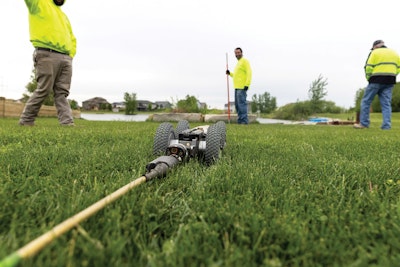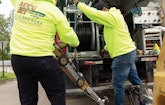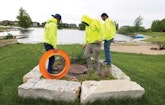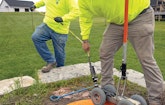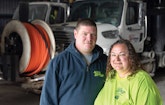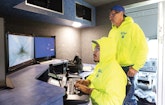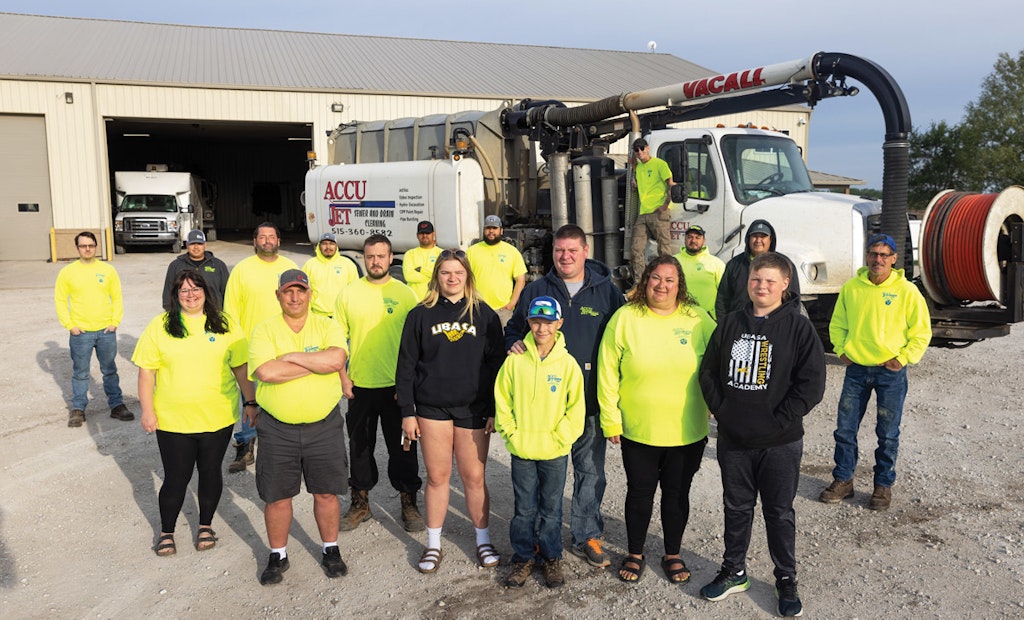
Kyle Baxter founded his family-run business in 2006. Iowa-based AccuJet provides inspection, cleaning and rehabilitation services and has grown to a crew of 18.
Interested in Cleaning?
Get Cleaning articles, news and videos right in your inbox! Sign up now.
Cleaning + Get AlertsAt just age 38, Kyle Baxter — the owner of Iowa-based AccuJet — has already spent decades in the drain cleaning industry. And one of the most important things he’s learned over the years is a lesson every entrepreneur in the industry with a Type-A personality should heed: Doing everything yourself is not the key to success.
Baxter’s aha! moment occurred around 2015, nine years after he established AccuJet, a drain cleaning and pipeline rehab company in Perry, about 40 miles northwest of Des Moines. At that point, running AccuJet was like exercising on a treadmill: running from job to job to job, day after day, but never really getting anywhere, he says.
“Everything was just a scramble,” he recalls. “I was constantly putting out fires and never moving forward — working in the business, not on the business. Plus, I thought I had to do everything, which was hurting the company.”
Something had to give. And for Baxter, who started helping his late grandfather clean drains when he was 7 years old, giving up and leaving the industry he loved wasn’t an option. So after doing some online research, the hard-driving entrepreneur took a radically different approach and hired a business coach, Monte Wyatt.
“We started digging into things like core values and processes and procedures,” he explains. “The coach also persuaded me to hire a salesperson. He helped me realize I had to delegate things to other people.
“It’s like a football team — if everyone does their job, you win games. The quarterback can’t do everything.”
It was a humbling realization when Baxter figured out he was a key obstacle to the company’s growth. But in the long run, it was worth it to eat a few slices of humble pie.
“When you realize you own a business, not a job, you get more personal enjoyment because you’re actually building a business by putting the right people in the right positions,” he says. “All I had to do is get out of the way.”
By letting go of various responsibilities, Baxter also gained more time with his family, which was much more fulfilling than 12- to 14-hour workdays, he says.
Learning from family
Baxter’s passion for drain cleaning and his strong work ethic stem from his grandfather, Wilford Roberts, who got into drain cleaning because of a drainline clog that caused a sewage backup in his shop in the late 1980s.
“He called the city and someone there told him to call the guy they used,” Baxter recalls. “The guy said he could be there in a week. So my grandfather did a little brainstorming and decided to build a water jetter out of an old pumper fire truck.
“He told the city that if he could unclog the line with the jetter and it stayed unplugged for 30 days, they had to pay him whatever they usually paid the drain guy. The jetter worked, the line stayed clear for 30 days and he sent the city a bill for $500.”
After that, Roberts started cleaning residential lateral lines. Baxter got involved at age 7 when a sewer backed up at a local country club.
“He gave me a pair of boots and sent me in,” Baxter says. “He later told me he didn’t think I’d stick with it after that first job. But I did.
“He also never paid me when I worked for him. He always told me, ‘Someday you’ll get paid for this.’ And he was right.”
Robert’s influence on Baxter was immeasurable.
“I was riding around in his truck when I was 3 years old,” he says of his grandfather, who died in 2015. “I was by his side pretty close to every day of my life. After he died, I and my wife, Mindy, bought his house and remodeled it. We still live there.”
Customer-driven expansion
After high school, Baxter took his only detour from drain cleaning and decided to clean hood ducts and vents in restaurants. Then he saw a for-sale ad for a drain business in Des Moines and decided to shift back into drain cleaning. He started AccuJet at age 22 after a banker suggested he’d be better off starting his own company than buying one, he says.
The business slowly evolved. Initially, the company concentrated on inspecting and cleaning drain tiles in farm fields. Baxter then progressed into other services as customers asked for them, including pipe bursting and pipe lining.
“We basically did whatever the market demanded,” he says. “I always wanted to be an innovator in the area, not trail behind my competitors.”
Continual investments in new equipment that met customers’ needs for services paid off big-time. Baxter says that about 15 years ago, the company generated about $300,000 annually.
“Now we do that in a month.”
The company’s roster of equipment now includes three Vacall AllJetVac P-Series combination sewer trucks with hydroexcavating capability. They’re built on Freightliner chassis and feature 12-cubic-yard debris tanks, 1,500-gallon water tanks and blowers from Roots (Howden).
For inspecting pipes, the company relies on three ROVVER X crawler cameras from Envirosight, two included in fully equipped camera trucks (Chevrolet Express 3500 cut-away cube vans); and a RapidView IBAK T76 tractor-mounted camera with lateral launch capability.
For cleaning and milling pipes, the company has invested in two Schwalm Talpa 2060 robotic cutters.
To line pipes, AccuJet deploys a T-Liner system from LMK Technologies, and a lateral pipe lining system and F-10 pipe lining system for mainline sewers, both from Perma-Liner Industries. The company uses steam-cured felt liners made by MTC (Manufactured Technologies, owned by Aegion Corp.).
“When we bought the Perma-Liner F-10 system in 2018, our goal was to line 1,000 feet of pipes a month,” Baxter says. “Now we line about 5,000 feet of municipal sewers per month.”
New market focus
In 2016, Baxter dramatically changed the company’s course by selling the residential drain cleaning side of AccuJet and concentrating on cleaning and rehabbing only large municipal lines instead. The result: better cash flow and profitability.
“I realized we were investing in large pieces of expensive equipment, then piddling around with $300 drain jobs,” he says. “You end up chasing more money with residential customers than we do in the municipal world, where money is pretty much guaranteed through contracts.
“And a lot of times, drain jobs cost much more than homeowners expect, so you don’t always get paid right away. Then you end up chasing that money down the road. So I sold my equipment to another company.
“We already were getting pretty dug into working on larger-diameter pipes, so it was a pretty simple transition,” he adds. “It’s worked out very well.”
In 2016, Baxter made another move that changed the company’s fortunes. Based on advice from Wyatt, he hired a salesperson.
Many drain cleaners might consider that an unnecessary expense. But it was a game-changer for AccuJet, Baxter says, because once again, it allowed him more time to work on the business, not in it.
“I thought a lot of people knew about us,” he says. “Then we hired a salesman, Johnny Herold, and quickly realized not as many people know about us as we thought they did.
“I never had enough time to get out in front of customers every day like I wanted to. But if that’s someone’s only focus, they can get in front of five or six customers a day.”
That’s important because Iowa has nearly 600 municipalities that might use AccuJet services. Plus, relief from sales calls free up Baxter to focus on pricing jobs, rather than “bouncing all over the place,” he says.
With a salesperson in place, the company was better able to expand its customer base as its service offerings grew. When the company only cleaned and inspected sewers, Baxter explains, it was hard to get work because most municipalities already performed that kind of work in-house.
“But as we’ve added different aspects of pipeline rehab solutions, we can offer every city something.”
About a year ago, Baxter continued his push for delegating more responsibilities and hired a general manger, Shannon Barnes, who focuses on managing the company’s day-to-day operations. That benefited Baxter because he wasn’t “putting out fires” all day, he says.
Baxter also relies heavily on Izzy Baltazar, operations manager; Chrissy Danger, an internal projects manager; and his wife, Mindy, a company co-owner who handles payroll and oversees the financial end of operations.
Growth through discomfort
After a false start years earlier, AccuJet again gave pipe lining a try in 2019. Baxter wanted to capitalize on an underserved market, but he also set a goal that year to make himself uncomfortable.
“When you make yourself uncomfortable — put yourself in riskier situations — you worry less about the easy stuff, which overall makes you more successful,” he says. “Making yourself uncomfortable allows you to challenge yourself to figure out the best way to do things, not the easiest way to do them.
“The best way to do things usually is the most uncomfortable way. Life would be pretty boring without that approach.”
Looking ahead, Baxter likes to set what he calls “big, hairy, audacious goals,” or BHAGs (pronounced “bee-hags”). The current goal: Get 100 Iowa municipalities to sign sewer maintenance contracts by 2026.
“We’re on track to get there. We’re at 65 right now.”
Then, keep setting more BHAGs.
“I love a good challenge,” Baxter says. “If you don’t dream big, you never get anything.
“The backdrop of my computer screen displays a quote from Richard Branson. It says, ‘If someone offers you an amazing opportunity, but you are not sure you can do it, say yes — then learn how to do it later!’
“I look at that every day and try to live it.”
